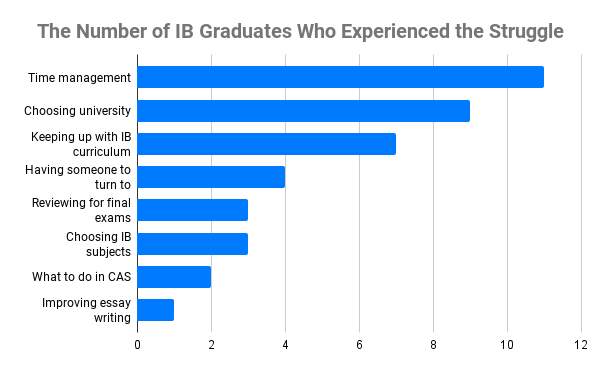If you’re an IB student and struggling with something, you might be feeling alone going through IB journey. But it’s okay, we’re here for you. While your feeling is totally valid, many IB students around the world are also going through a similar struggle. Thanks to 21 IB graduates who kindly answered our original survey, you might find some solutions in this article.
1. What do IB students struggle with?
Let’s first take a moment to see what IB students generally struggle with. 21 IB graduates shared their struggles which are summarized in the bar chart below.

The most common struggle is time management. IB curriculum could give you several tasks at once and multitasking requires you to manage time wisely. As exhausting as it sounds, it’s the key to surviving IB journey. You can’t also forget to take a rest as well, so time management is important not only for your academic success but also for your mental and physical health.
Another common struggle is choosing a university, which is not something specific to IB students but it may still put a lot of pressure on IB students. IB students can be concerned about the application and selection process because they may be different for IB students depending on the university. Also many get anxious about their future because it’s just impossible to see what lies ahead of them.
Keeping up with IB curriculum takes a lot of effort and you might sometimes feel lost in the classroom even when you’re trying your best. The difficulty varies depending on many things such as the combination of six subjects, the level of each subject, teachers, and students’ capacity.
2. Tips from IB Graduates to Overcome IB Struggles
Here, IB graduates share tips with you to overcome each IB struggle. If you find some of their personal experience relatable or useful, give it a try for a while and see if things get easier or better.
2.1 Time Management
- “It’s especially hard to manage time efficiently if you have school’s regular exams and IB at the same time. But I tried to decide how much time I’d be spending on each assignment or subject beforehand and finish it in time.” – Kaede. Y
- “It was just impossible to cover everything during my free time, so instead I started focusing only on the topics I hate in each subject.” – Ryunosuke. K
- “When I had to manage CAS, IA, and EE on top of reviewing each subject, I was often frustrated that some things weren’t going as planned. So I tried to choose activities that could be related to the subject I was taking for CAS and also tried to ask teachers or classmates for help when I got stuck with something I was reviewing.” – Koko. H
- “When multiple exams overlapped on the same day, I used to spend too much time on my favorite subjects or memorize too much in detail for the subject I hate because I had no idea what was important in the topic. It might be better to take a little time to calm down and think about the priority for efficient study.” – Miyuki. I
- “I spent too much time trying to deepen my understanding of the content, especially for subjects like Math and Chemistry. Because of this, I didn’t spend much time on past paper problems or any practice problems in general, which wasn’t an efficient way of studying. I noticed this towards the final exam period and tried to do more past paper problems but I think it wasn’t enough.” Maya F.
- “Studying for college entrance exams and IB at the same time was hard and my brain was about to explode quite often. So I started making a to-do list for the day to visualize the goal and it became less stressful.” – Mahiro. T
- “I tend to procrastinate on my assignments and therefore was rushing to finish them right before the deadline. I am not good at working constantly for a certain amount of time (like working on my IA for 30 mins every day), so I made a day or two where I dedicate the entire day to work on my assignments and that worked for me.” – Hope
2.2 Choosing University
- “I tried to gather information from upperclassmen to clear up which country I want to go to and what I want to study in college.” – M.S
- “I wasn’t really sure about what I wanted to study in college so I chose to major in liberal arts where the study focuses on various topics. I also applied to universities in Canada and Australia because I wanted to experience a new culture in a country I’ve never been to before. “ – Miyuki. I
- “I wasn’t sure about my passion so I applied to the majors related to the subject I was fairly good at. But after randomly applying to universities based on my IB score, I got too many acceptance letters to pick one. I finally picked up eight criteria to narrow down the universities and compared them based on objective perspectives from people around me.” – Yuma. N
2.3 Keeping Up with IB Curriculum
- “My English was beginner-level when I first started IB and I had no idea what the teacher was talking about in classes with complex vocabulary like economics and chemistry. So I increased my study hour at home to review the topics we covered on the day with a dictionary and stuck to the routine. I was pretty happy when I started understanding the topic without the dictionary.” – Kanon. W
- “I wasn’t confident about my English so I tried to memorize the questions’ format and solving steps by practicing with past papers many times for math, and talked a lot with my teacher for English.” – HY
- “I tried my best to contact upperclassmen, along with speaking to my teachers for sections I did not understand. One thing I did was gather past papers from IB, in order to grasp question patterns and how the exams will be carried out.” – Kanta
2.4 Having Someone to Turn to
- “There were no past students from my school who took my application path so I had no one to talk to. I tried to do everything by myself from understanding the application guide to preparing for the entrance exam in the local language. But I also asked my tutor for advice.” – Yu. K
- “Since I was living by myself in a foreign country, I only had few people to turn to. I stopped trying to do everything by myself and started asking my teacher and classmates for help when I was having trouble.” – s
2.5 Reviewing for Final Exams
- “I had a hard time getting the trend of final exams but I gathered past papers for the last 20 years and figured out ways to prepare for exams after practicing several times.” – Y.N
2.6 Choosing IB Subjects
- “There were many interesting IB subjects and I was confused thinking about the academic career after graduation. I talked to upperclassmen and chose the subjects I was most fascinated about.” – M.S
- “I thought too much about the influence of the choice in IB subjects on the future academic career but in reality, it might not have much influence (meaning you could apply to social studies after taking many science subjects and vice versa). So it all comes down to whether you’re interested in the subject.” – Miyuki. I
2.7 What to Do in CAS
- “My CAS coordinator changed between Grade 11 and 12, and the change in plan and expectation confused me while the COVID pandemic limited outside activities. But I realized there’s a variety of projects I could participate online (i.e. creating maps with NGO) and I tried to connect the learning outcomes in CAS reflection so that the coordinator could see my ideas and activities more clearly.” – U. Hayashi
- “I’m not a physically active person, so it was hard to come up with Action. I somehow satisfied the required time by running three times a week.” – Acorn
2.8 Improving Essay Writing
- “Until IB, I used to go to the local school so I had no idea how to pick a topic for my research and write a report about it. So I tried to check and follow the criteria for each assignment one by one, went to my teacher for feedback and reflect on it, and read a lot of research papers online to get an idea of what a good report looks like.” – s
3. Other Articles You Might Want to Check
For more information related to the struggles mentioned in this post, check the links below.
